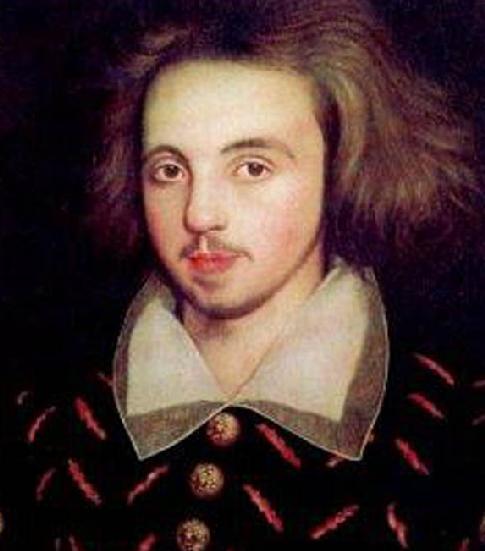
| Biography Part II |
A Dangerous Mind
The religious authorities mark him as an enemy
A Date at Deptford
What happened at Dame Bull's house?
The First Heir of His Invention
Suddenly, . . Shakespeare
Shake-speare
A steady supply of plays, in the style of Marlowe
Marlowe
The only writer with the proven ability to write poetry and dramatic verse at a "Shakespearean" level. For two centuries, scholars have proclaimed that Shakespeare learned how to write by studying Marlowe's style.
Speculation that they were friends and shared manuscripts is prompted by the striking similarity of Marlowe's later works to Shakespeare's early works.

A Dangerous Mind
The religious authorities mark him as an enemy
On the evening of 5th May 1593, an anti-immigrant poem, now known as the
"Dutch Church Libel," was posted o the wall of a London church. It was
in blank verse similar to Marlowe's, was signed by someone calling
himself "Tamburlaine," one of his most famous characters, and included
references to two of his other plays. The implication seemed to be that
he was, at least in part, responsible for stimulating the civil unrest
that was being threatened in it. The Privy Council insisted that the
author should be found and punished.
A few days later, the playwright Thomas Kyd (of Spanish Tragedy fame)
was arrested, apparently following a tip-off that he was responsible for
the libel. His room was searched, and allegedly heretical papers found,
which he said must have come from Marlowe, when they were 'writing in
one chamber' together a couple of years earlier. Although innocent of
the original charge, Kyd was tortured, and trying to distance himself
from Marlowe as much as possible accused him of atheism. He later
repeated in writing roughly what accusations he must have made, and
followed this up with a letter to Sir John Puckering, the Lord Keeper,
giving further details.
On 18th May, Marlowe was sent for to appear before the Privy Council,
the Court being then at Nonsuch in Surrey, which he did on Sunday the
20th. In contrast to the way Kyd had been treated, however, he was
released "on bail," with a requirement that he report back to them daily
until told otherwise. There is no record as to whether he did in fact do
so or not.
Meanwhile, other damning documents were appearing, all of which
confirmed him not only as an atheist himself, but one who encouraged
atheism in others. These were the so-called "Remembrances" concerning
Richard Cholmeley, some further accusations about him, and the famous
"Baines Note," with its list of accusations levelled against Marlowe. So
much damning material seems to have appeared in such a short time, in
fact, that it is difficult to escape the conclusion that an orchestrated
campaign had been mounted against him.
A Date at Deptford
What happened at Dame Bull's house?
Only ten days after his first appearance before the Privy Council,
however, Christopher Marlowe was gone. According to the report of the
inquest on his death, he and three other men Ingram Frizer, Nicholas
Skeres and Robert Poley met on the morning of 30th May 1593 at the
Deptford home of a widow called Eleanor Bull. They had lunch together,
and spent a quiet afternoon in the house and walking in the garden.
After dinner that evening the other three were sitting with their backs
to Marlowe, who was lying on a bed near to them. An argument broke out
between Marlowe and Frizer concerning the payment of the bill, or
"reckoning." Marlowe drew Frizer's dagger from behind him and hit him on
the scalp with it, wounding him. A struggle ensued in which Frizer
thrust the dagger into Marlowe's head, just above the right eye, killing
him instantly. Two days later the Coroner of the Queen's Household, who
officiated at the inquest, and sixteen jurors, found Frizer to have
acted in self-defence, and he was free within the month. Marlowe was
reportedly buried in the churchyard of St. Nicholas, Deptford, on the
evening of June 1st, 1593.
The First Heir of His Invention
Suddenly . . Shakespeare
Within weeks of Marlowe’s reported death on May 30, 1593, the first
appearance of William Shakespeare’s name as a writer occurred with the
publication of the poem Venus and Adonis. The author referred to the
poem as “the first heir of my invention”. It had been registered
anonymously on April 18, 1593 before Marlowe’s arrest only obtaining the
name of William Shakespeare when it was printed sometime in June. It was
dedicated to the Earl of Southampton, who at the time was still a ward
of the court under the guidance of Lord Burghley. It is the first time
William Shakespeare’s name is recorded as a writer.
The rise of "Shake-speare"
A
steady supply of plays, in the style of Marlowe
Before Marlowe, scholars say, neither true English blank verse nor
genuine English tragedy existed. By 1593, the year he was arrested on
suspicion of heresy, Marlowe had laid the foundations of what today we
know as Shakespearean drama. Why are Marlowe's revolutionary
accomplishments largely unknown? Because Marlowe’s name has been reviled
for four hundred years, his reputation in ruins. Shakespeare by contrast
has enjoyed a never-ending rise in fortune bordering on deification.
Marlowe’s literary career was abruptly severed in 1593 just when he
seemed on the verge of true greatness. Shakespearean scholar A. C.
Bradley, writing in 1880, tells us: "Marlowe had many of the makings of
a great poet: a capacity for Titanic conceptions which might with time
have become Olympian; that Marlowe must have stood nearer to
[Shakespeare] than any other dramatic poet of that time, or perhaps of
any time later, is probably the verdict of nearly all students of the
drama."
Before the arrival of Shakespeare, Marlowe alone demonstrated the
ability to write ‘Shakespearean’ plays. If Marlowe had remained alive
after 1593 and continued to grow as a writer, his plays could have
equalled the Shakespeare plays. Another Shakespearean scholar, F. P.
Wilson, writing in 1951, made the case that "what we may anyhow believe
is that in [1593] there perished at Deptford the only man of
Shakespeare’s age who could have been a rival poet."
But what if Marlowe did not perish in 1593? And what if, since he stood
accused of atheism, blasphemy, and treason, it was impossible for him to
publish work under his own name? And what if Marlowe were the victim of
the worst form of literary blacklisting, in real fear for his life,
writing and publishing in secret? Perhaps, if he had survived, he would
not have been a rival of Shakespeare, he would have been Shakespeare.